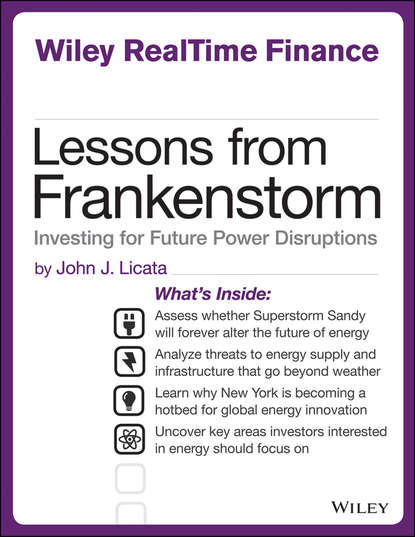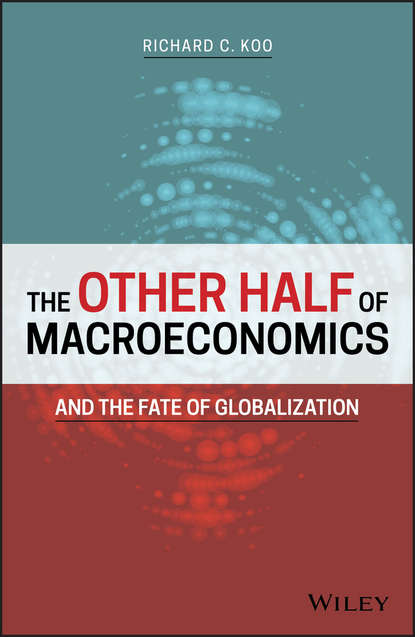Книга "Уроки от Франкеншторма. Инвестирование для будущих отключений электроэнергии" рассматривает проблему нехватки электроэнергии, вызванной не только катастрофическими погодными условиями, такими как ураганы, цунами и землетрясения, но и кибератаками. Авторы книги утверждают, что необходимо бороться с энергетическими уязвимостями, прежде чем они приведут к финансовому хаосу по всему миру. В книге представлен обзор последних событий, которые способствовали отключению электроэнергии в разных уголках мира, и особое внимание уделено угрозам, связанным с погодными условиями, терроризмом и кибератаками. Авторы также рассматривают возможности, которые есть у правительств и энергетических компаний для борьбы с этими проблемами и предлагают перспективные направления инвестирования в новые технологии и альянсы, которые могут сделать энергетическую систему более устойчивой. Книга также исследует опыт Нью-Йорка и Нью-Джерси, которые восстановили свою энергетическую систему после урагана Сэнди, и даёт рекомендации, как извлечь уроки из этих событий и создать глобальный план по энергетической инновации и защите от возможных киберугроз.
В последние годы мир столкнулся с растущим числом ураганов, цунами и землетрясений, которые поставили десятки миллионов людей без света и подорвали экономический рост. Однако сегодня погода - это не единственная угроза из-за возникающих перебоев в электроснабжении. Сейчас необходимо принимать меры, пока негативные последствия непогоды и потрясений в природной погоде не привели к финансовому хаосу по всему миру, а также с помощью кибератак. Книга "Уроки Франкеншторма" научит вас, как эффективно защищаться.
Электронная Книга «Lessons from Frankenstorm. Investing for Future Power Disruptions» написана автором John Licata в году.
Минимальный возраст читателя: 0
Язык: Английский
ISBN: 9781118774175
Описание книги от John Licata
The world has been brought to its knees in recent years due to an increased amount of hurricanes, tsunamis and earthquakes which collectively have left tens of millions without power and derailed economic growth in the process. However, today weather is not the only threat to massive power loss. It’s time to fight back before energy weaknesses and instabilities from disruptive weather patterns cause financial chaos around the world through cyberwarfare. In Lessons from Frankenstorm, you'll learn how to fight back. Overview: A look back at recent events (Fukushima, India blackout, Sandy here in the U.S., August 2003 blackout in Northeast U.S., etc.). Set up the case that something needs to be done, especially with warming temperatures (2012 was the hottest year on record). What are threats? Focus here is on weather (temperatures, rising tides, global warming, dwindling water supplies which impact certain energy sources (i.e. fracking, biofuels), terrorism (cyberterror which may create a whole new investing sector in the very near future). What can governments and utilities do? It could be good to focus on disaster recovery efforts, crisis management, legislation, planning and strategy AHEAD of next major storm or terrorist threats that could rattle global financial marketplaces. New legislation could lead to new asset allocation by investors, technology companies, utilities and private equity. Legislation (i.e. endorsing modern nuclear power, offshore wind, etc.) may also cause new alliances, joint ventures as a result. Could Frankenstorm be used a global blueprint for energy innovation? Here focus on efforts seen in New York and New Jersey emerging from the darkness and ruin left by Superstorm Sandy through the real next generation energy technologies and themes that investors may want to focus on for the next decade (i.e. thorium nuclear reactors which China just announced they are moving toward—should the U.S. follow?). Complacency is not the answer. Doing nothing and simply waiting for another major power outage that not only challenges our credibility as a superpower in a new world economy but could also cripple global market centers (maybe look at how slow Japan has reacted to Fukushima while Germany moved way too fast in my view to move away from nuclear power—something that has caused surging electricity prices).



















